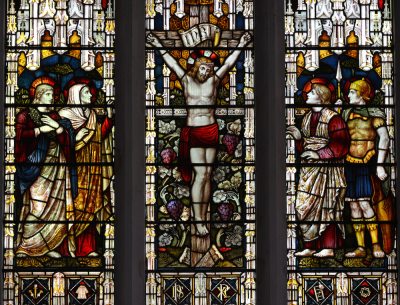Trinitarian heresies and why the Trinity matters

I recently encountered a conversation on social media regarding the importance of the Trinity.
The question posed was this: “Can a person be saved if they deny the Trinity?”
In our very comfortable, cultural Christianity here in the United States, many professing Christians might say yes. But to say yes would be to deny the truth of Scripture and thousands of years of Church history.
We don’t have to know everything there is to know about God, but we cannot have a proper understanding of the Gospel that saves us without understanding who it is that saves us in the first place.
Trinitarian heresies have reared their ugly heads for centuries, yet the Church has always prevailed. For those of us who are in Christ, though, it is our responsibility to know these heresies when we hear them, correct them if possible, avoid the wolves teaching them, and warn others as well.
What is the Trinity?
The Trinity is made up of one eternal, immutable Godhead and three distinct, co-eternal, co-equal, and co-powerful persons. They are in perfect harmony with one another, and they consist of one substance. The Father is not the Son (John 8:16); the Son is not the Holy Spirit (Acts 10:38); and the Holy Spirit is not the Father (John 14:26) — yet they are one God.
The Athanasian Creed explains it this way:
“For the Father is one person, the Son is another, and the Spirit is still another. But the deity of the Father, Son, and Holy Spirit is one, equal in glory, coeternal in majesty. What the Father is, the Son is, and so is the Holy Spirit … Eternal is the Father; eternal is the Son; eternal is the Spirit: And yet there are not three eternal beings, but one who is eternal.”
While every person of the Godhead is co-equal, they each have a different role: The Father chooses who will be saved (Ephesians 1:4), the Son redeems them (Ephesians 1:7), and the Holy Spirit seals them for all eternity (Ephesians 1:13).
The Athansian Creed goes on to say: “Whoever wishes to be saved must think thus of the Trinity. And whoever does not guard [this faith] will perish eternally.”
A misunderstanding of the Trinity has also paved the way for heresies that deny the relationship between the Father, the Son, and the Holy Spirit and also deny the omnipotence, omniscience, and omnipresence of God.
The Trinity is simply who God is. If we mistake the character or the attributes of God, then we cannot put our faith in the God of the Bible. We end up putting our faith in a god that does not exist. That is why it is essential that we understand the Trinity so that we can have a true understanding of who God is and how He saves us.
Trinitarian heresies
Modalism
Modalism is a heresy commonly embraced by the United Pentecostal Church and even by a some mainstream evangelical celebrity pastors. You may have heard of modalism if you’ve ever heard the Trinity illustrated with water — God the Father being ice, God the Son being water, and God the Holy Spirit being vapor. It’s a common analogy used, but it’s wrong. It’s actually a heresy.
Modalism says that God is a single person who has revealed Himself in three different “modes,” or manifestations throughout biblical history. So, God was God the Father in the Old Testament times; at the incarnation, He was the Son; and after Jesus’ ascension, He was the Holy Spirit, but He was never God the Father, God the Son, and God the Holy Spirit at the same time. Even though it retains the divinity of Christ, modalism denies the distinctiveness of the three persons in the Trinity.
In Psalm 110, we see the LORD, or Yahweh — God the Father — speaking to the Son and never setting aside His identity to pick up another:
“The LORD says to my Lord: ‘Sit at my right hand, until I make your enemies your footstool.”
In John 17, we see the Son praying to the Father, indicating that the incarnation did not cause the Father to exchange His identity to become the Son.
“Father, the hour has come; glorify your Son that the Son may glorify you…”
Arianism
Arianism is a heresy largely embraced by Mormons and Jehovah’s Witnesses, and it says that the first and greatest creation of God is the Son of God, by whom God made all other things. In other words, Arianism is the view that Jesus the Son of God did not always exist eternally; rather, He was created by God the Father. It denies the deity of Christ and characterizes Him as a finite, created being with some divine attributes, though not eternal and divine in and of Himself.
It is true that Jesus is fully God and fully human, but He did not take on humanity until the incarnation. Where Arianism mistakenly sees Christ’s human nature as a limitation on His divinity, Christ’s human nature is simply what made Him fully man — it had no impact on His divinity or eternality.
But in John 8:58, Jesus Himself proclaimed His eternality:
“Truly, truly, I say to you, before Abraham was, I am.”
And in John 10:30, He proclaims His divinity:
“I and the Father are one.”
Tritheism
Tritheism is the heresy that the three distinct persons of the Trinity are three distinct gods. This denies the unity of the Trinity and the monotheistic nature of God. Rather, tritheism worships a polytheistic god.
Properly understood, the three “persons” of the Trinity do not mean three gods. According to gotquestions.org,
“Person can be defined as ‘a center of self-consciousness.’ A person has a mind, emotions, and a will, can communicate with others, and is capable of performing actions. When we speak of the concept of personhood as it relates to the Trinity, we are describing self-distinctions in God. All three Persons of the one triune God possess the complete attributes of deity. All three Persons are truly divine, yet eternally distinct from one another.”
It is true that there are three distinct persons of the Trinity, and thankfully, as God Himself declared in Isaiah 43:10, we can be certain that there is only one God:
“Before me no god was formed, nor shall there be any after me.”
Scripture also tells us that the Father, the Son, and the Holy Spirit are God:
- “… For on him God the Father has set his seal” (John 6:27).
- “… the appearing of the glory of our great God and Savior Jesus Christ” (Titus 2:13).
- “… God’s Spirit dwells in you” (1 Corinthians 3:16).
Adoptionism
Adoptionism is a heresy that teaches that Jesus was a sinless man, and for that reason, God chose Him and adopted Him as His Son. This view not only denies the deity of Christ, but it also destroys the Gospel message and the way in which we are justified. It says that Jesus was merely a man, finite in nature, who happened to be without sin. If this were true, Christ’s death and resurrection would be insufficient for the salvation of man because He was only a mutation of God, rather than God Himself.
Because of the curse of Adam in Genesis 3, there are no sinless men. Everyone born after the fall has inherited Adam’s sin nature, and it is impossible that our works, or “filthy rags,” as Scripture calls them, could ever make us justified before a Holy God.
Romans 3:23-25 affirms this unequivocally:
“For all have sinned and fall short of the glory of God, and are justified by his grace as a gift, through the redemption that is in Christ Jesus, whom God put forward as a propitiation by his blood, to be received by faith.”
Jesus was sinless, true. But His sinlessness cannot be attributed to His own efforts as a “man.” While Jesus became incarnate, taking on flesh, He never ceased to be fully God. Yes, He lived a life of perfect obedience, thereby fulfilling the law, succeeding where Adam, Israel, and we failed. But His sinlessness was not what made Him God, but rather an extension of the divine mystery of God being found in human flesh.
Unitarianism
Unitarianism is generally a heresy held among those who belong to the Unitarian Universalist Church. Where Trinitarianism states that God is triune, or three in one, Unitarianism states that God is simply one. Unitarians teach that Jesus was an inspired man, a great teacher who did good works, and a good example to follow, but He is not God.
Conclusion
These Trinitarian heresies are exactly why a biblical understanding of the Trinity matters.
We don’t have to fully grasp the Godhead, but we do have to be sure we get it right. We cannot be Christians and fail to “worship one God in Trinity, and Trinity in Unity, neither confounding the persons, not dividing the substance.”
I pray that this solidifies for you your view of the Godhead and serves as an apologetic to spot heresies when you hear them.
Originally published at the Standing for Freedom Center.
Reagan Scott is a Louisiana-raised Christian conservative activist and influencer who gained national attention after she lost her job for speaking out about her biblical and conservative beliefs online. She jumped at the invitation to relocate to Phoenix, AZ to work as a media administrator for Turning Point USA.
As she got more involved in conservative activism, Reagan quickly realized a deep divide among professing Christians and became convicted by the lack of the gospel message in Christian conservative circles. While Christians so often find themselves desiring to “fix” the culture, they often need the reminder that the problem in our culture is sin, and the only solution is the saving work of Jesus Christ. Since working for Turning Point USA, Reagan has begun communications work for a political campaign and miscellaneous student organizations and ministries, all while utilizing the online platform God gave her by pointing young Christians and conservatives to biblical truth.
Reagan currently resides in Dallas, TX with her husband and two cats, where she enjoys reading books, making homemade household cleaning items, and eating good food.



























